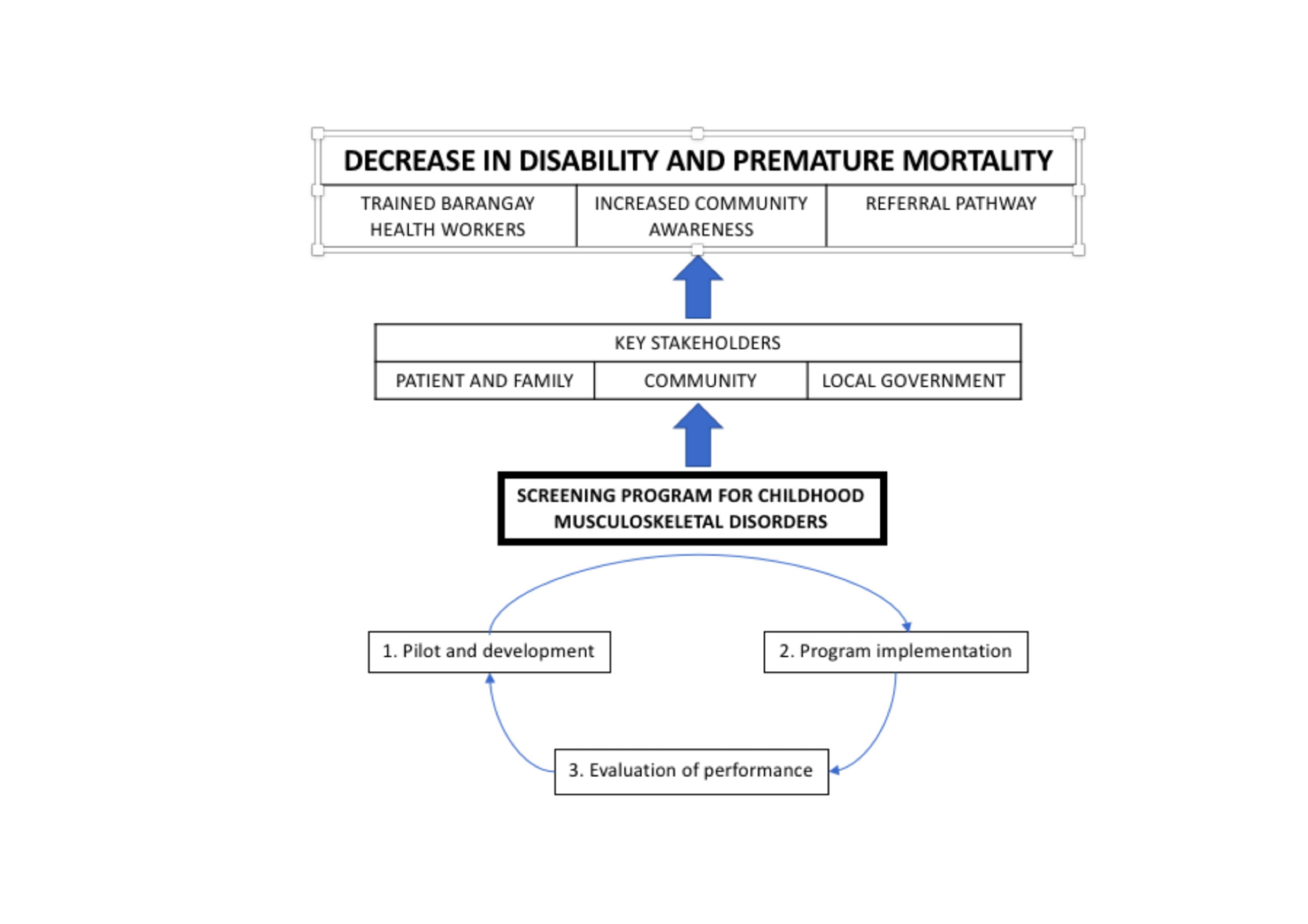Session Information
Session Type: Poster Session B
Session Time: 10:30AM-12:30PM
Background/Purpose: Musculoskeletal diseases (MSD) are relevant across the life-course – from childhood to older age. In children, the most common MSD are fractures, scoliosis, arthritis syndromes, and connective tissue diseases and these are among the largest contributors to the need for rehabilitation services. Left untreated or diagnosed late, MSD can cause physical and psychosocial impairment and greatly affect growth and development, education, and future health. Because of the significant burden of morbidity of untreated childhood MSD, coupled by the limited number of pediatric rheumatologists in the Philippines, increased MSD awareness in the community-level, early detection through community-based screening by equipped Barangay Health Workers (BHW), and timely referral and treatment or rehabilitation are important actions to prevent severe or permanent disability from MSD. Potentially upscaling The Joint Project in other barangays in the Philippines will support the United Nations Sustainable Development Goals of decreasing premature mortality from non-communicable disease and reducing poverty because income or opportunity loss due to disability.
Methods: The project was implemented in seven phases: (1) permissions and coordination, (2) community needs assessment through key informant interviews, focused group discussions, and town halls, (3) validation of the Filipino version of the PGALS tool, (4) seminar-workshop on childhood MSD for the BHW, (5) community lectures on childhood MSD by the BHW, (6) creation of a referral system for childhood MSD, and (7) endorsements and monitoring.
Results: Permissions from the barangay captain, city health officer, and BHW head to conduct the project were sought, followed by a courtesy call and ocular visit to the City Hall, the Rural Health Unit (RHU) and Barangay Langgam community. A total of six BHW were attended the seminar-workshop-all females, married, college graduates, and working full-time at the RHU for at least five years. The seminar-workshop was able to equip them with the knowledge and skills necessary for childhood MSD screening was achieved. The BHW were able to utilize the validated pGALS tool with ease. The BHW and the RHU were oriented of the newly-created referral network system of eight health facilities to facilitate the care of cases detected in the community. Post-activity evaluation and monitoring, including an echo lectures on childhood MSD by BHW in the form of lay fora, showed increased awareness of the barangay on childhood MSD. Furthermore, it was found that having BHW as screeners had high acceptability among the local government, the local health workers, and the residents of the community.
Conclusion: Because of the significant undesirable effects of childhood MSD on mobility, quality of life, and socio-economic status, increasing the awareness of the community on childhood musculoskeletal health and early identification of MSD for prompt referral are imperative. In a resource-limited country like the Philippines, harnessing the skills of BHW in promoting musculoskeletal health and in MSD screening in the community setting can be effective in preventing disability and other morbidity from undiagnosed and untreated childhood MSD.
disorders (adapted from Andermann A et al, 2010)
To cite this abstract in AMA style:
Collante M, Mercado-Asis L. The Joint Project: A Community-Based, Barangay Health Worker-Led Screening Program for Childhood Musculoskeletal Disorders in a Barangay in San Pedro, Laguna, Philippines [abstract]. Arthritis Rheumatol. 2024; 76 (suppl 9). https://acrabstracts.org/abstract/the-joint-project-a-community-based-barangay-health-worker-led-screening-program-for-childhood-musculoskeletal-disorders-in-a-barangay-in-san-pedro-laguna-philippines/. Accessed .« Back to ACR Convergence 2024
ACR Meeting Abstracts - https://acrabstracts.org/abstract/the-joint-project-a-community-based-barangay-health-worker-led-screening-program-for-childhood-musculoskeletal-disorders-in-a-barangay-in-san-pedro-laguna-philippines/

